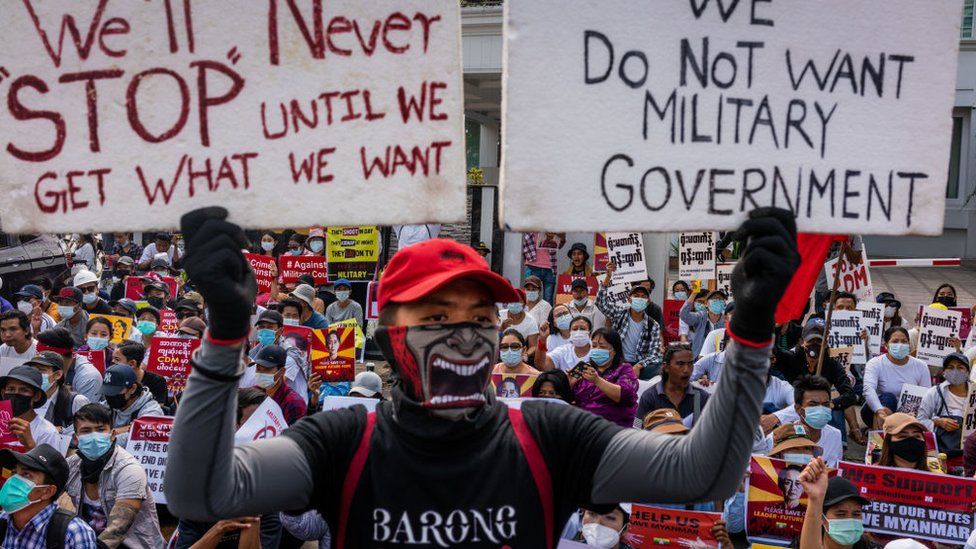Access to the internet appears to have been blocked for a second night running by Myanmar’s new military rulers.
UK-based monitor NetBlocks reported a “near-total internet shutdown” from 01:00 local time (18:30 GMT) on Tuesday.
It is the fourth shutdown since the 1 February coup as the junta tries to stifle dissent, much of it online.
Earlier, the military authorities announced stiff penalties for those opposing the coup leaders.
Signs that another outage was imminent came after an internet service provider told BBC Burmese that online access was being blocked.
The latest shutdown follows a pattern aimed at disrupting continuing opposition to the coup, which overthrew elected leaders including longtime democracy campaigner, Aung San Suu Kyi, who is still in custody.
Access to Facebook, a rallying point for a campaign of civil disobedience, was restricted soon after the coup. Use of Twitter and Instagram was also disrupted.
Major telecoms provider Telenor has said it will no longer be updating a list on its website of internet disruption. It told AFP news agency that the situation was “confused and unclear” and said that employee safety was a “top priority”.
The military’s presence is growing. At many strategic locations, soldiers have replaced the police.
In the main city, Yangon, eight-wheeled armoured vehicles have been seen trying to navigate the rush-hour traffic, sometimes surrounded by cars honking in opposition to the coup.
Protests focused on the central bank building, the US and Chinese embassies, and the city headquarters of Ms Su Kyi’s National League for Democracy.
As demonstrators gathered in the central city of Mandalay again on Monday, there were reports of security forces firing rubber bullets to disperse crowds.
In footage posted on social media, the sound of what appears to be gunshots can be heard as crowds flee, with several people later appearing to display injuries.
A leading student activist who has gone into hiding, Myo Ko Ko, told the BBC why he and others were willing to risk their lives.
“We strongly believe in democracy and human rights. We know that it’s risky,” he said.
“I have to move to another place day by day because of being searched (for) by police. We hope the international community will help us.”
Students also protested in the capital, Nay Pyi Taw. Dozens were arrested and later released.
Residents in several cities are reported to have formed night-watch groups to deter mobs rumoured to have been dispatched by the military to cause unrest.
Thousands of prisoners have been been given amnesty. Though this is normal to deal with prison overcrowding, there are fears that the military will use some of those released to exert pressure on anyone opposing the regime.
What are the new punishments protesters face?
The demonstrators are demanding the release from detention of their elected leaders, including Ms Suu Kyi, and the restoration of democracy in Myanmar, also known as Burma.
But the ruling junta has threatened long prison sentences and fines for anyone found to incite hatred towards the military, “by words, either spoken or written, or by signs, or by visible representation”.
In a statement posted on a military website on Monday, it said that people preventing the security forces from carrying out their duties could face 20 years in prison, while those found to stir up fear or unrest in public could be imprisoned for terms of three to seven years.
The military government on Saturday gave itself the power to make arrests, carry out searches and hold people for more than 24 hours without a court ruling.
It has also told journalists not to describe the military’s takeover as a coup.
What is happening with Aung San Suu Kyi’s trial?
On Monday, Ms Suu Kyi’s lawyer said she would be detained for a further two days. She will then be tried via video link at a court in the capital on Wednesday, Khin Maung Zaw added.
Ms Suu Kyi was rounded up with other members of the government on 1 February, but her detention was due to end on 15 February.
The charges against her include possession of unlawful communication devices – walkie-talkies used by her security staff.
Her party was elected in a resounding victory last November, but the military has alleged voter fraud without providing proof.

